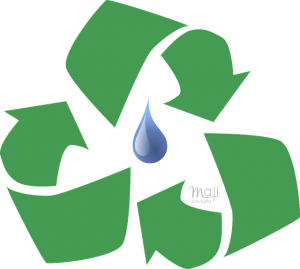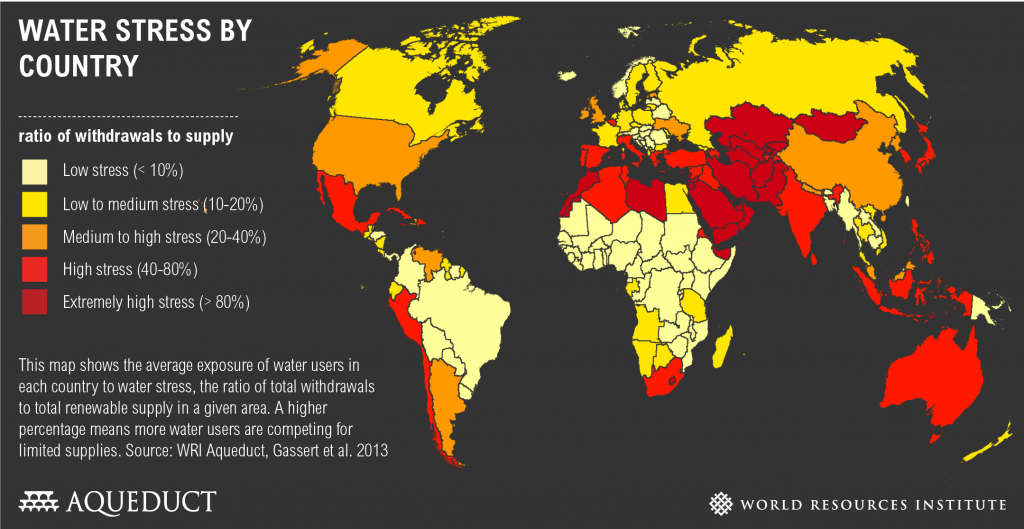Wastewater is water affected by human activities. Any wastewater that is discharged to the environment without suitable treatment might cause environmental pollution. As a matter fact 80% of urban wastewater is still discharged into natural environment without any treatment.
What is wastewater reuse?
Wastewater reuse or water recycling is is the use of treated wastewater (or untreated wastewater) for a beneficial purpose.
One of the key advantages of recycling water is to protect water resources by reducing water pollution discharges and the need for water to be removed from natural habits.

Why is water reuse important ?
Reuse as an alternative solution to water shortage
World water consumption has doubled between 1960 and 2000 (Planetoscope) even though freshwater is a rather rare resource: it represents less than 3% of the hydrosphere. Only a third of this water is potentially consumable by humans since two thirds of this water are frozen in glaciers and polar ice caps (UNESCO, 2003).
Moreover this water distribution on the earth is heterogenous. This is how water stress levels are so elevated in some countries.

Water stress by country 2040 (World Resources Institute)
The water treated for reuse in the Mediterranean basin (Spain, Israel) and in the USA is predominantly used for agricultural irrigation.
In the developed countries, water reuse depends on national european regulations that need to get more flexibility.
“Wastewater is a valuable resource in a world where water is finite and demand is growing.” Guy Ryder, Chair of UN-Water, World Water Day, March 22, 2017
Wastewater is also a source of nutrients for agriculture. That explains why irrigation with untreated (or partially treated) wastewater is a common practice in developing countries in sub-Saharan Africa, Asia and Latin America. Health risks can be important for farmers and population. The challenge in these countries is to develop appropriate treatments for each application for a safe wastewater reuse.
Water reclamation and recycling in developing countries is a true sustainable development path creating jobs and producing food.
Another common form of water reuse is industrial recycling, where an industrial facility will reuse “waste” water on site for processes such as cooling.
An environmental conservation strategy
Wastewater recycling helps to preserve aquatic life and biodiversity by reducing polluting discharges into surface water. These discharges have major economic repercussions and negative impacts on the environment since they make any kind of normal activity impossible in the contaminated zone for a long time afterwards.
Some of those incalculable damage caused by water pollution are summarised in the following table, data provided by ASEF (2010).
| Compounds | Impact on natural environment |
| Suspended matters |
|
| Organic matters |
|
| Nitrogen and phosphorus |
|
| Metals |
|
| Pesticides |
|
Water reuse examples
- Israel is a global leader in water recycling since it reuse more than 78% of its wastewater (Tirosh, 2016). Nearly 50 % of farmlands are watered by reclaimed water. The first Israel standards for water reuse were developed in 1952 (Salgot et al, 2001).
- In Windhoek (Namibia), reclaimed water has been used for potable uses since 1968. Recycled wastewater is blended with drinking water and represents about 35% of Goreangab plant drinking water production (Lahnsteiner et. al., 2007).
- Bill & Melinda Gates Foundation has given ONAS the opportunity to test a innovative technology for the value addition to fecal sludge in Dakar (Senegal). The Omni-Processor is a facility for the cogeneration of electricity and heat, which converts combustible sludge and solid waste into electricity, hot water and ashes.
Read more: Sanitation Key Facts
References:
J. Lahnsteiner and G. Lempert, Water management in Windhoek, Namibia, Water Science and Technology 55, 2007, 441 – 448
Rapport mondial des Nations Unies sur la mise en valeur des ressources en eau 2017
Salgot, M.; Angelakis, A.N. Guidelines and regulations on wastewater reuse. In Decentralized Sanitation and Reuse: Concepts, Systems and Implementation; Lens, P., Zeeman, G., Lettinga, G., Eds.; IWA Publishing: London, UK, 2001; pp. 446–466.
U. Tirosh, Israel’s journey to reusing 78 percent of wastewater, World Water : Water Reuse & Desalination 7, Issue 1, 2016
UNESCO. Rapport mondial sur la mise en valeur des ressources en eau, l’eau pour les hommes, l’eau pour la vie. 2003.

1 thought on “Water reuse: why is it important ?”
Comments are closed.